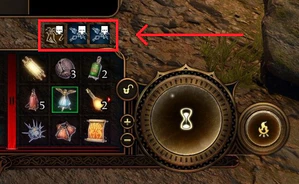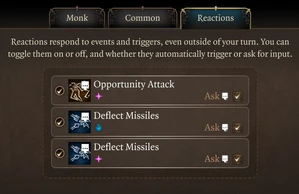Ad placeholder
Actions
Actions are the acts taken by creatures on their turns in Baldur's Gate 3. Actions are generally taken in order to deal damage or inflict harmful conditions, but they can also be taken to heal or aid allies.
A special form of action – known as a reaction – can be used as a response to certain triggers, including on the turns of other creatures.
Taking actions usually requires the acting creature to expend one of three resources:
- Action
- Bonus action
- Reaction
Overview[edit section | visual editor]
Actions are categorised by their source:
- Common actions
- Common actions are actions available to all creatures.
- Class actions
- Class actions are actions available through features, such as those gained from classes or equipment. Many actions taken by NPCs are also considered class actions.
- Racial actions
- Racial actions are actions available through racial features, and are exclusively gained from race.
- Situational actions
- Situational actions unlock as a result of another ability, feature, or condition. It remains at the side of the character's hotbar until the conditions creating it expire. One such example is Forced Manoeuvre as a result of Manoeuvring Attack (Melee).
- Weapon actions
- Weapon actions are actions available through equipping weapons.
- Spells
- Spells are cast by casters and by other creatures through the use of scrolls.
Resources[edit section | visual editor]
Creatures take actions in turn-based mode by expending one of two resources: Action or Bonus action.
Additionally, some actions require both of the two resources to be expended.
An additional resource – Reaction – is used to take conditional reactions on another creature's turn.
All creatures have 1 charge of each of the three resources that recharges at the beginning of each turn, but additional charges can be gained from various sources.
Exceptions[edit section | visual editor]
- Additional actions
- Actions that allow a creature to take an additional action per turn – such as Action Surge – do not consume the resource they provide.
- Free attacks
- Classes that have the Extra Attack feature may take one additional Free Attack action on their turn after taking an Attack action, without expending an Action resource.
- Level 11 fighters have the Improved Extra Attack feature and can take two additional Free Attack actions on their turn after taking an Attack action, without expending an Action resource.
Reactions[edit section | visual editor]

Reactions are actions taken in response to a trigger, and can be taken even if triggered on another creature's turn.
Some reactions require the acting creature to expend a Reaction resource, whereas other reactions do not. Those that do not are generally class features which use the reaction system, such as Divine Smite, Reckless Attack, or Sneak Attack.[1]
The Reactions tab[edit section | visual editor]

Reactions are managed for each character through the Reactions tab, located on the spellbook page of a character sheet. The tab can also be accessed immediately by pressing on one of the active reactions on the hotbar, or by pressing a hotkey (default: L).
Reactions can be set to be taken automatically, or the game can be set to prompt the player first.
If taking the reaction expends any resources, they are listed under the reaction's name.
Limitations[edit section | visual editor]
A character cannot apply more than one reaction to the same event if any of them prompt for confirmation; the UI prevents selecting more than one reaction per character.
The set of reactions triggered by an event is determined before any of them take effect. This means an attack roll or saving throw that would normally ignore a reaction (e.g. because the roll succeeded and the reaction is a roll bonus from an ally) ignores that reaction even if the roll outcome is changed by another reaction.
Events ignored by reactions[edit section | visual editor]
Damage and saving throws that are not immediate effects built into non-reaction actions (including actions initiated by reactions or passive features) are generally ignored by reactions except as noted below.[2]
Concentration saves, death saves, saves to end a condition early, and saves or damage built into area effects, conditions, reactions, or exploding items (other than arrows and launched fireworks) are ignored.
Saving throws of passive features are ignored except for the following:
- Reverberation[3]
- Oil of Bane and Oil of Diminution coatings[3]
- Simple, Serpent Fang, Wyvern, and Purple Worm toxin coatings[3]
- Passive features granted by the following equipment:
- The following NPC passive features:
Preventing reactions[edit section | visual editor]
Creatures can be prevented from taking many reactions by a number of conditions. These include:[4]
- Any fleeing condition such as Fearful
- Any incapacitating condition such as Hold Person
- Any invisibility condition, which prevents all reactions besides Accursed Spectre, Blinding Ambush, and Weird Magic Surge
- Any polymorph condition besides disguises and Starry Forms [See: Bugs]
- Any restraining condition such as Ensnared
- Any stunning condition, namely Stunned
- Any unconscious condition such as Prone
Other conditions prevent creatures from spending Reaction resources. These include:
This latter set of conditions does not prevent affected creatures from taking reactions which do not consume the Reaction resource. Such reactions notably include Legendary actions performed by bosses in Honour mode. These actions are triggered like reactions but use a different resource making them unaffected by these conditions.
Examples of reactions[edit section | visual editor]
Spells[edit section | visual editor]
Class actions[edit section | visual editor]
Lists of common actions[edit section | visual editor]
Actions[edit section | visual editor]
Bonus actions[edit section | visual editor]
Bugs[edit section | visual editor]
- Reactions to saving throws ignore those for Staggering, Thunderous, and Wrathful Smite and Topple the Big Folk.
- Most reactions that are normally disabled by non-disguise, non-Starry Form polymorph conditions (such as other Wild Shapes) are erroneously enabled if the creature also has a disguise or Starry Form condition.
See also[edit section | visual editor]
- Category:Bonus actions, a category of all bonus actions.
Notes[edit section | visual editor]
- ↑ Many class features which are implemented as reactions in Baldur's Gate 3 are not reactions in D&D 5th Edition which Baldur's Gate 3 is based on. This change may have been made because reactions were added to the game fairly late in development.
- ↑ This limitation is inherent to
InterruptContextflagsOnPostRollandOnPreDamage.OnPostRollreactions can trigger onSavingThrow()calls in passive featureStatsFunctorsbut not theirConditions.OnPostRollreactions ignoreSavingThrow()calls nested within function arguments. - ↑ From the definition of
IsAbleToReactinMods/Shared/Scripts/thoth/helpers/CommonConditions.khn,EnableConditionfield data (for polymorph), and theInterruptWhileInvisibleflag. Reactions may check for both polymorph andIsAbleToReact, just one, or neither.




















































































































































































































